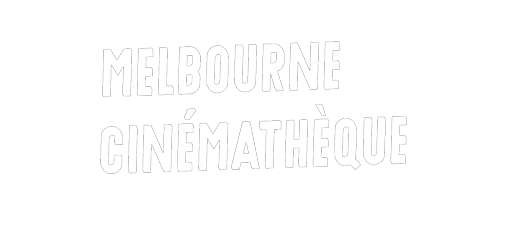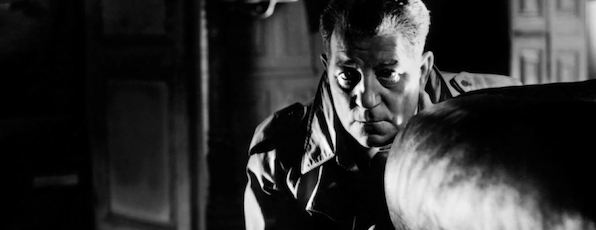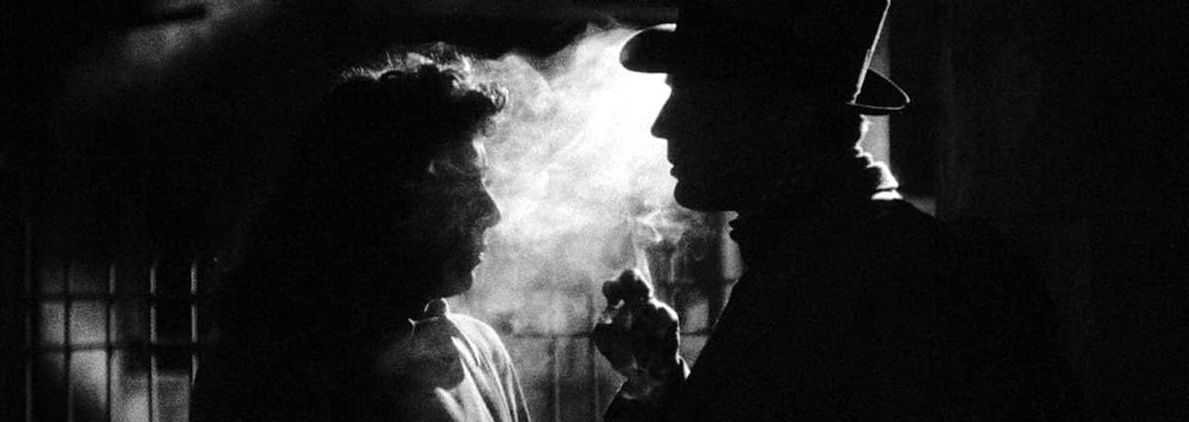
30 August – 13 September
Although film noir is primarily associated with American cinema of the 1940s and 1950s, France played a key role in its development, both in its appreciation (the term was coined by French critic Nino Frank in 1946) and continuation of the genre. It is perhaps fitting that Rififi (1955), considered by many to be the ultimate French noir, was directed by Jules Dassin, an American exiled in Paris. This season provides an important link between pre-war French examples of the genre such as Julien Duvivier’s Pépé le Moko (1937) and its apotheosis in Jean-Pierre Melville’s 1960s gangster films. Both Panique (1946), the first film Duvivier made in France after working in Hollywood during the war, and Quai des orfèvres (1947), Henri-Georges Clouzot’s first film in four years after the controversy of Le corbeau (1943), are very much darkened by the shadow of war and reckon with France’s postwar troubles – both material and psychological. The 1946 French release of over 2000 American films banned during the war was a watershed moment in the country’s cinema as critics, screenwriters and directors began to absorb the 1940s American crime films’ styles and themes. By the mid-1950s, the popularity of Jacques Becker’s Touchez pas au grisbi (1954), Rififi and the underrated Henri Decoin’s Razzia sur la Chnouf (1955) illustrated the renewed interest in the French crime film. This season profiles many of the finest examples of the French gangster and crime film up until the full-scale arrival of the nouvelle vague, including Claude Sautet’s wonderfully acerbic Classe tous riques (1960), starring Lino Ventura and Jean-Paul Belmondo.

7:00pm QUAI DES ORFÈVRES
Henri-Georges Clouzot (1947) 106 mins – Unclassified 15+
A worldly detective (the wonderfully gruff and quizzical Louis Jouvet) investigates the murder of a sleazy film financier. Filled with the seedy and teeming atmosphere of the postwar Parisian music hall, Clouzot’s return to filmmaking after four years is a characteristically earthy, forensically detailed and noir-inflected mixture of social realism, dark humour and cynical psychological study. Widely regarded as one of the key postwar crime films, it won best director for Clouzot at the Venice Film Festival. Co-starring the director’s then-lover, Suzy Delair.
CTEQ ANNOTATION
Quai des Orfèvres
by David Sanjek
9:05pm RAZZIA SUR LA CHNOUF
Henri Decoin (1955) 105 mins – Unclassified 15+
The year after his iconic performance as the world-weary gangster in Touchez pas au grisbi, Jean Gabin returned to the Parisian criminal underworld milieu in this wonderfully hardboiled adaptation of the novel by Auguste Le Breton (also a source for Melville’s Bob le flambeur and Dassin’s Rififi). Examining the illicit hard drug trade, the underrated Decoin’s brilliantly appointed noir is an important precursor to the more nihilistic and existential works that would follow in its wake. A particular favourite of Bertrand Tavernier, it also features Marcel Dalio and Lino Ventura.
CTEQ ANNOTATION
The Fading Kouros of Razzia sur la chnouf (Henri Decoin, 1955)
by Grant Bromley

7:00pm CLASSE TOUS RISQUES
Claude Sautet (1960) 103 mins – Unclassified 15+
Lino Ventura plays a wanted gangster, tapping former colleagues to assist his return to Paris, while Jean-Paul Belmondo is cast as the young criminal who remains loyal when the betrayals start piling up. Sautet skilfully adapts the novel by real-life murderer and Nazi collaborator José Giovanni, who based the leading character on one of his fellow inmates, a one-time Gestapo henchman. Sautet uses genre to paste over a casual ruthlessness that French society wasn’t entirely ready to admit to at the time, the wartime shame of so much dishonourable behaviour still fresh in the cultural memory. With Marcel Dalio.
CTEQ ANNOTATION
Classe Tous Risques (Claude Sautet, 1960)
by Brad Weismann
8:55pm LE TROU
Jacques Becker (1960) 132 mins – Unclassified 15+
Shot in Jean-Pierre Melville’s studio, Becker’s last film is a claustrophobic and meticulously detailed portrait of five men who attempt to tunnel out of prison. Adapted by José Giovanni (Le deuxième soufflé) from his own novel, this is a milestone in the history of films on the subject of incarceration. A departure in style for its director, its use of non-actors – including one of the prisoners ostensibly playing “himself” – rigorously stylised camerawork and “real” sounds produce a remarkably authentic and Bressonian sense of locale. Evocatively shot by Ghislain Cloquet, this is one of the great final works of the cinema.
CTEQ ANNOTATION
Le Trou
by Darragh O’Donoghue

7:00pm RIFIFI
Jules Dassin (1955) 117 mins – M
Endlessly imitated though never matched, Dassin’s definitive heist movie was one of the major crossover hits of mid-1950s international cinema, helping save the director’s career following his exile to France in the wake of the Hollywood blacklist. Its famous 28-minute robbery sequence, filmed entirely without dialogue, is a true masterclass in building cinematic tension. With the director casting himself as Cesar the safecracker, the central character of the movie’s key scene, Dassin’s film is often read as a veiled critique of the corruption and backstabbing prevalent in the Hollywood that betrayed him.
35mm print courtesy of the National Film and Sound Archive, Australia.
CTEQ ANNOTATION
Du rififi chez les hommes (Rififi) (Jules Dassin, 1955)
by Martyn Bamber
9:10pm PANIQUE
Julien Duvivier (1946) 99 mins – Unclassified 15+
After working in the United States for five years during World War II, Duvivier returned to his native France to direct this dark tale of murder and mob misrule – based on Georges Simenon’s novel – mixing the sordid glamour and high stylisation of the Hollywood film noir with the grittier social concerns of French poetic realism. One of the earliest allegorical films made in the period immediately after the war about collaboration in Nazi-occupied France, it was judged a “near perfect film” by Pauline Kael. With Michel Simon and Viviane Romance.
CTEQ ANNOTATION
Scenes from a Manhunt – Panique (Julien Duvivier, 1946)
by Rolland Man